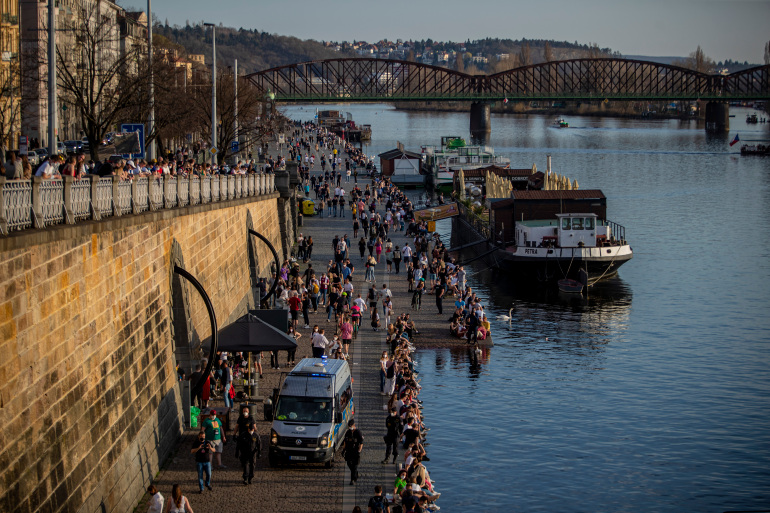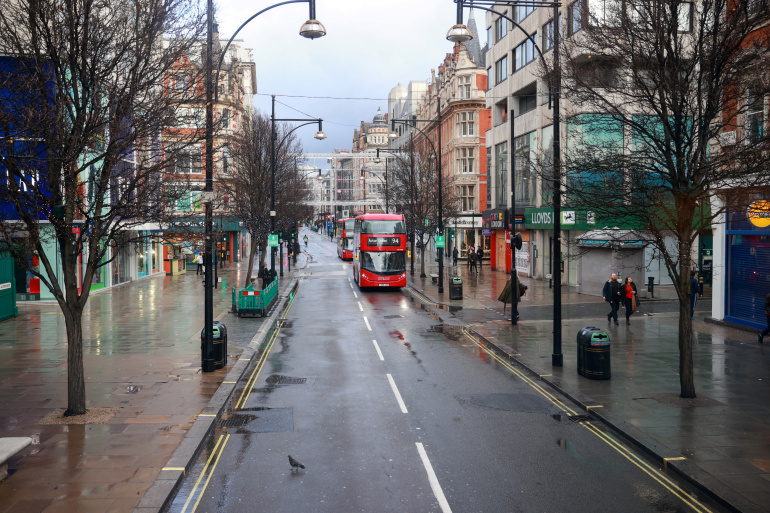Prague, Czech Republic – In 2004, frustrated with “the old corrupt ways” and meagre wages, newly-graduated Blanka Kaše jumped at the chance to escape to London.
Fourteen years later, she returned to the Czech Republic as a wife, mother and businesswoman, taking up residence with her family in a large homestead set in the rolling hills of southern Central Bohemia.
“I told my sister: ‘I’ve gone crazy! I’m thinking of moving back to the Czech Republic’,” the 41-year-old told Al Jazeera, speaking from her kitchen, where the walls feature colourful drawings by her sons aged six and seven.
Kaše, who now runs a language school from her home near the town of Sedlčany, 60km south of Prague, said although it was not the only reason to leave the United Kingdom, Brexit was a push factor.
And like many others, she has found that her home country has changed almost as much as she has in the past 15 years.
With the Czech Republic’s European Union membership 17 years ago, the opportunity appeared plentiful in the UK, while the central European country was still extricating itself from the remnants of the communist system.
Its migration outflow peaked at 33,000 in 2006.
The departure of graduates such as Blanka was so quick that it prompted fears of a “brain drain” that the government was almost helpless to fight.
But Brexit could be something of a magic bullet.
“I had decided to stay in the UK for good, but Brexit changed everything,” Eva Pavelkova, who moved from Prague to Manchester after graduating as a vet in 2006, said with emotion.
“Britain no longer felt like the same country that I had chosen as my home.”
The 39-year-old returned to Prague, with her British husband, in December.
Accurate data on the numbers returning are not available.
However, of the 100,000 or so estimated by the Czech ministry of foreign affairs to be living in the UK, fewer than 60,000 had applied to stay by the end of 2020.
The remainder have until July to do so.
Brexit is not the sole issue driving Czechs home.
Most returnees also speak of wishes for their children to go to Czech schools and a desire to be closer to ageing parents.
But the UK’s divorce from the bloc is a key factor for most. And on landing, many say they have been pleasantly surprised by how the country has changed for the better.
Underlying that progress is an economy that has grown rapidly over the past 15 years.
The country’s gross domestic product (GDP) per capita is now close to the EU average; unemployment has been the lowest in the bloc for several years.
The OECD’s Better Life Index shows that disposable income rose by 12 percent between 2005 and 2017, even though Czechs are working significantly shorter hours.
 People enjoy sunny and warm weather walking and sitting on the bank of the Vltava River in Prague, Czech Republic [Martin Divisek/EPA-EFE]
People enjoy sunny and warm weather walking and sitting on the bank of the Vltava River in Prague, Czech Republic [Martin Divisek/EPA-EFE]
“Leaving our careers in the UK we were worried about money and jobs before we arrived, but it’s been great so far,” said Pavelkova, who is setting up her own business as an animal cardiologist.
Blanka Kaše’s husband Miroslav had similar worries and took some persuading to leave the UK.
However, he agreed when he realised that the family could swap their cramped house near London for a large spread that he hopes will soon host a swimming pool for the boys, alongside the collection of cows, sheep and chickens that patrol around the former farmhouse.
He operates a thriving equipment hire business from the former barns, and the family lives mortgage-free.
That makes it “every British person’s dream”, Kaše said with irony.
But the changes run deeper than economics. The OECD index shows that housing conditions have improved markedly and life expectancy has increased by two and a half years.
In other rankings, the country comes out ahead of the UK in many categories, including personal safety, healthcare and basic education.
“Quality of life has definitely improved for someone who has been away for more than a decade,” Christian Kvorning Lassen, deputy director at Prague-based think tank Europeum, told Al Jazeera.
“The Czech Republic performs strongly in indicators pertaining to basic human needs, and well above average in most other indicators too.”
Returnees told Al Jazeera of other changes they have welcomed with optimism, advances that are trickier to capture in numbers and which illustrate how the brain drain is reversing.
Finding his career path blocked by the “guys from the old regime” that still dominated the Czech health system in 2005, Dr Zdeněk Klezl spent the next 15 years working in the UK as a spinal surgeon.
He faced no such obstacles on his return in November and is now training a new cohort of surgeons at Czechia’s biggest hospital Motol in Prague.
He said the healthcare system to which he has returned is now significantly better than the UK’s.
The 63-year-old said he was “pleasantly surprised by how efficient and friendly services and public institutions have become”.
Pavelkova also noted with astonishment that even Czech bureaucracy, the inspiration for Franz Kafka’s nightmarish novels, is not to be feared these days.
After so many years away, she now feels at home.
“I know Czechia isn’t perfect. There are lots of issues that we still need to deal with. But I think I’m better off here now,” she said.
Those eyeing the worrying demographics across Central Europe will listen with hope to these stories.
However, the threat of a brain drain is never far away in this part of Europe, which analysts like Lassen note still has work to do on the quality of life indicators such as discrimination, civic engagement or the environment.
“I think I’m back for good; I’m happy here looking after our cow and sheep,” Kaše laughs. “But Czechia is very homogenous and very small. I’ll certainly encourage the kids to go out to explore the world when the time comes.”
 A general view of Oxford Street in London [Hannah McKay/Reuters]
A general view of Oxford Street in London [Hannah McKay/Reuters]





